Theater / Film
Review: Bringing Complexity to Life, Zoetic Stage Reveals a Masterful ‘The Mother’
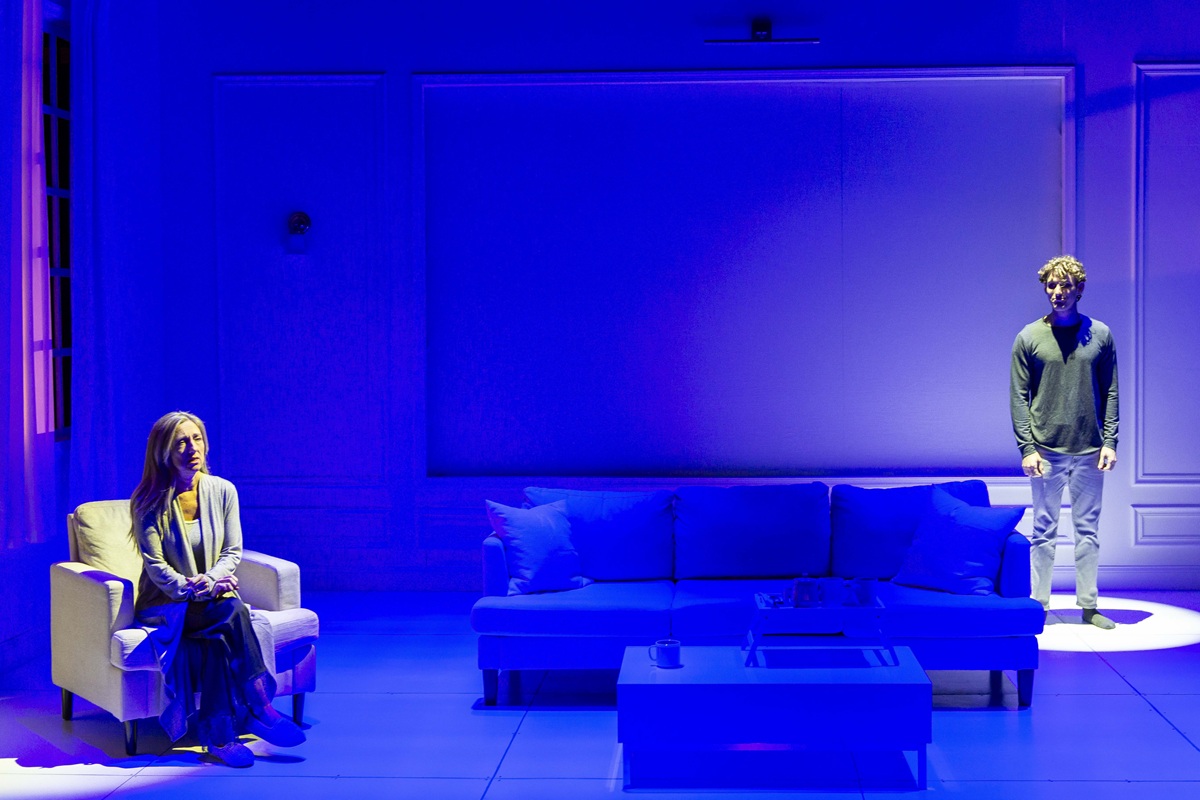
Jeni Hacker as The Mother and Davis Parks as The Son in a scene from Florian Zeller’s play “The Mother” at Zoetic Stage at the Adrienne Arsht Center through Sunday, Nov. 23. (Photo by Justin Namon/Courtesy of the Adrienne Arsht Center)
“The Mother” by French playwright Florian Zeller is the story of a woman, Anne, whose empty nest syndrome has mentally gotten the best (or worst) of her.
Stuart Meltzer, artistic director of Zoetic Stage and director of the regional company’s 16th season opener, has long wanted to stage a play by Zeller —one of the most frequently produced contemporary playwrights today, known for his domestic trilogy “The Mother,” “The Father,” and “The Son.”
During his opening speech, Meltzer asked for a show of hands from the audience of how many had seen the film “The Father,” which won two Oscars at the 2021 awards for Anthony Hopkins as Best Actor and Zeller and Christopher Hampton, for adapted screenplay. Many had. If Hampton’s name is somewhat familiar, he’s best known for his translation of “Dangerous Liasons” and for Yasmina Reza’s play “Art” (now in a revival on Broadway) and “God of Carnage. He has become Zeller’s most trusted collaborator and the playwright himself credits Hampton with preserving the emotional integrity of the original French in the English versions.
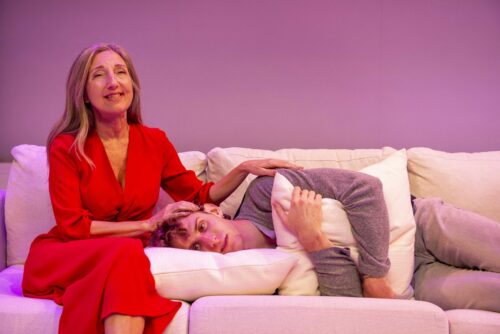
Jeni Hacker as The Mother comforts The Son (Davis Parks) after his breakup. (Photo by Justin Namon/Courtesy of the Adrienne Arsht Center)
Meltzer retained the British dialect (Rebecca Covey’s dialect consulting helps with the authenticity) used in Hampton’s translation. The director’s choice keeps the cadence of Zeller’s dialogue, which is essential to the play’s rhythm and emotional precision.
It is the right call. A bit jarring and unexpected at first, it proves essential, heightening the tension and capturing these people’s lives, where everything looks fine on the outside but the mess underneath is hard to ignore.
Jeni Hacker, veteran South Florida actor and a favorite of Meltzer’s, plays The Mother, Anne. We’ve seen her venture into this “unraveling mind” territory before in the company’s 2023 “Next to Normal” as Diana, a mother battling bipolar disorder. Here as Anne, Hacker explores similar territory – another complex portrait of a women grappling with identity dependent on family and the maternal.
While they share some commonalities, Hacker’s Anne unravels inward – most indicative is when she mumbles things under her breath, side swipes about her husband, Pierre (Stephen B. Anthony) — knowing that he is within earshot. Many of the murmurings allude to her believing he is cheating on her.
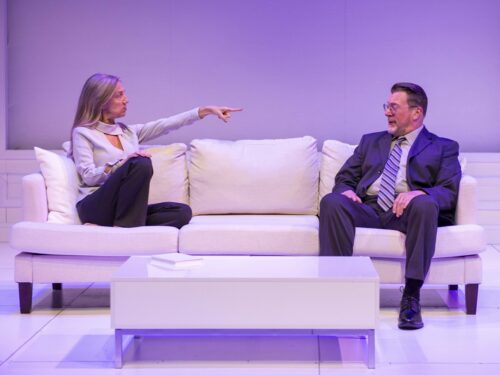
A place on a long white couch becomes The Mother’s safe haven. Here, Jeni Hacker as The Mother and Stephen G. Anthony as The Father are seated at opposite ends showing their emotional and physical distance. (Photo by Justin Namon/Courtesy of the Adrienne Arsht Center)
The long white couch is an important element in “The Mother” as Anne almost never leaves it. Barefoot and curled up with her feet under her, she seems physically and emotionally stuck — the couch becomes a marker of isolation. It also defines the space of the play, with much of the action revolving around it. When Pierre sits with her, he positions himself at the far end, emphasizing their emotional and physical distance.
Zeller has a clear stylistic choice in his plays, especially the trilogy: scenes often play out and then repeat with small changes. The repetition doesn’t push the plot forward but draws the audience deeper into Anne’s spiraling thoughts.
This looping structure recalls the existential absurdity of Samuel Beckett and the way Harold Pinter blurs reality and perception. Meltzer understands both Beckett and Pinter and his deft direction allows for satisfying shades of these influences.
Anthony as Pierre is constantly under Anne’s scrutiny, as she questions whether he might be unfaithful. The actor balances her emotional rollercoaster with a calm, often deliciously snide demeanor, playing up their daily routines and highlighting the distance between them while acting as the steady calm to her sudden storms.
The object of Anne’s obsession is her son, Nicolas, now 25, out of the house, and in a relationship with “The Girl,” whom Anne blames for taking him away. She recalls, “Before he used to drop by the house. On Sundays. Not every Sunday… but some Sundays… I leave him messages, he doesn’t answer.” When Pierre tells her “he’s growing up,” she snaps back, “You call that growing up? I call it being cruel…” Anne also admits she’s always loved Nicolas more than her daughter, Sara: “It’s never been a secret, I’ve always preferred Nicolas.” She adds that she remembers the day her daughter was born she felt “strangely repelled.” We never see Sara.
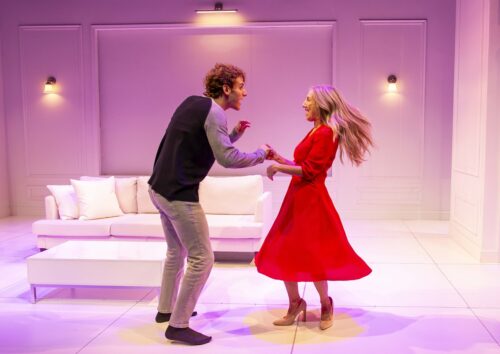
Jeni Hacker as The Mother wants a night on the town with her son, Nicolas, as she coaxes him to go out with her. (Photo by Justin Namon/courtesy of the Adrienne Arsht Center)
Davis Parks, as Nicolas, The Son, skillfully embodies the weight of his mother’s obsession — sometimes comforting her and other times losing patience with her smothering. Parks makes us feel the claustrophobia.
Allie Beltran as The Girl (her name referenced in the play as Eloide), the outsider who adds more fuel to Anne’s obsession with her son, has a demanding role. She must shift between different facets of the character – the sobbing ex who shows up at the door, then having to step into flirtier and sometimes even sinister personas. Through her changes in tone and movement, she makes the distinctions while also conveying how Anne sees her – both real and a projection of The Mother’s fears.
Meltzer consistently heightens the anxiety throughout the 100-minute, no intermission play. At two points, the back wall opens to reveal a pianist (Jeff Hess) playing “Für Alina” and “Variationen zur Gesundung von Arinuschka,” but only when Anne is alone. The musician, behind a scrim, bathed in color yet dressed in white and almost angelic, creates an eerie, dreamlike effect. These interludes deepen the sense of disorientation and isolation, while the haunting music mirrors and amplifies Anne’s emotional spirals.
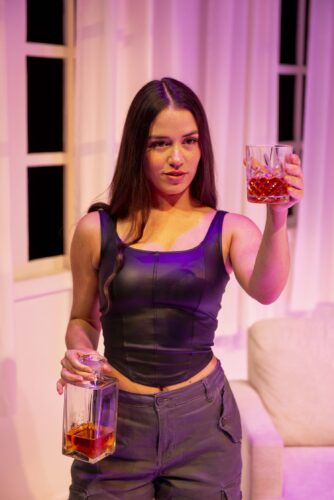
Allie Beltran as The Girl has to play different personas from the sobbing ex girlfriend to the vixen. (Photo by Justin Namon/Courtesy of the Adrienne Arsht Center)
Jacob Brown’s scenic design of the main playing area — the living room — centers on the long white couch, which acts as the anchor of Anne’s world. The space is neat and stylish, signaling an upper-middle-class household, but small details like the liquor cart stage right remind us of Anne’s coping mechanisms and add to her sense of isolation.
Costumes by Laura Turnbull highlight the generational and emotional contrasts in the play. At one point, The Girl shows up in a red dress — the same one Anne covets and dreams of wearing for a night on the town — emphasizing the age divide and Anne’s jealousy. Pierre’s suit and tie look reflects his composed, down-to-business presence, while Anne wears Ann Taylor–style shirts and pants, neat and put-together, which contrasts her inner turmoil.
Lighting design by Rebecca Montero reflects shifts in moods and times of day. A scene where two characters have direct white lighting beaming down on them while the rest of the stage is bathed in a deep blue highlights the isolation. Bailey Hacker’s sound design helps shape the emotional world of “The Mother.” Subtle ambient sounds and well-placed cues reflect Anne’s shifting moods, while the piano interludes start quietly and build to an almost maddening pitch, amplifying the sense of her spiraling, out-of-control thoughts.
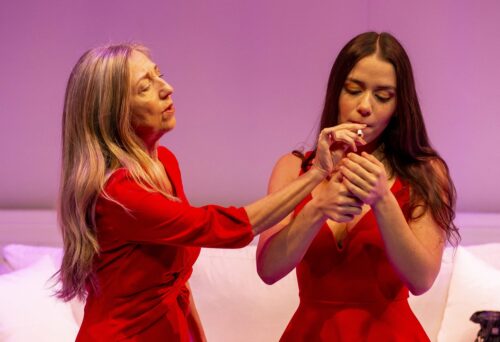
Both in red dresses, a scene in “The Mother” shows the generational divide. (Photo by Justin Namon/Courtesy of the Adrienne Arsht Center)
Tying everything together in a subtle choice and likely to be missed except for the keenest of ears, Meltzer chooses English singer Kate Bush’s “Mother Stands for Comfort,” which plays at the curtain call. The song, about a mother’s willingness to protect her child at all costs, is indicative of the attention to detail that makes Zoetic Stage’s production of this psychological dramedy challenging and satisfying theater.
WHAT: Zoetic Stage’s “The Mother”
WHERE: Carnival Studio Theater at the Adrienne Arsht Center for the Performing Arts, 1300 Biscayne Blvd., Miami
WHEN: Performances 7:30 p.m., Wednesday, Thursday, Friday and Saturday, 2:30 p.m. Sunday. Additional matinee Saturday, Nov. 22. Through Sunday, Nov. 23.
COST: $72.54, $66.69 (includes fees).
INFORMATION: (305) 949-6722 or arshtcenter.org
ArtburstMiami.com is a nonprofit media source for the arts featuring fresh and original stories by writers dedicated to theater, dance, visual arts, film, music and more. Don’t miss a story at www.artburstmiami.com.
